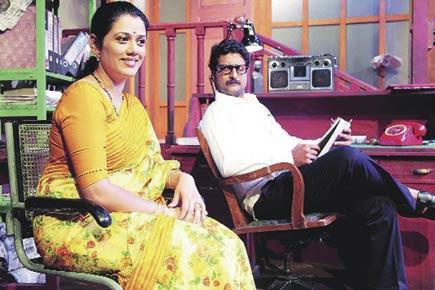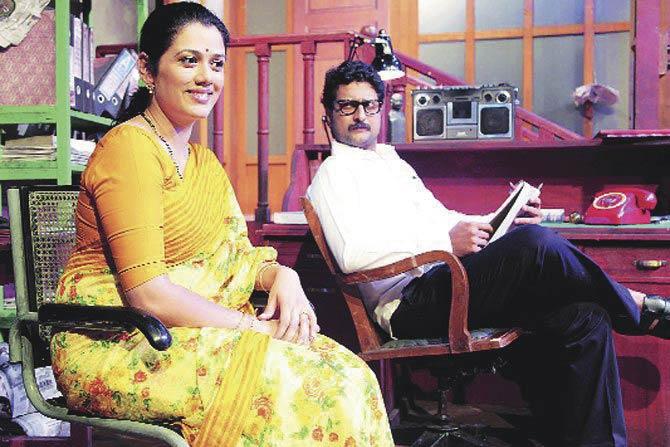A newspaper office circa 1989. The ramshackle place is held together by a bamboo pole. If it is removed, it is possible the structure will collapse

 A newspaper office circa 1989. The ramshackle place is held together by a bamboo pole. If it is removed, it is possible the structure will collapse.
A newspaper office circa 1989. The ramshackle place is held together by a bamboo pole. If it is removed, it is possible the structure will collapse.
For Kshitij Patwardhan, who has adapted (from HM Marathe’s News Story) and directed the Marathi play Don Special (don as in two in Marathi, not gangster) it is a symbol for the decline in the standards of journalism that started about then. The rise of big business, the powerful builder lobby, talk of liberalisation, the politician-industrialist nexus, increasing corruption — and in the midst of all this tumult, a journalist trying to hold on to his principles.
ADVERTISEMENT

The play, Don Special, digresses a bit when Swapna narrates her back story, but the audience is kept on tenterhooks about what Bhagwat will do
The man is Milind Bhagwat (Jitendra Joshi) who works with a Pune paper called Dainik Hindustan. Established with the idealism that drove a lot of newspapers then—the portrait of the founder and leaders like Gandhi, Tilak and Nehru adorn the walls —there is no saying which way things will go.
It is the night shift, Bhagwat has just met an earnest young man Umesh Bhosle (Rohit Haldikar), who has been inspired by Bhagwat’s fearless writing to become a journalist. He is hired on the spot, perhaps because Bhagwat recognises in the rustic fellow the bright spark that has dulled in him over the years.
The news of the day is the collapse of a wall of an under-construction cultural centre building that killed a family of three. Bhagwat has in his hands the heart-rending photograph of a little girl, who has lost her parents and an infant brother in the horrific accident, obviously caused by negligence. He plans to put that photo on the front page, with the news over three columns, naming the builder.
In the quiet of the newsroom, when the paper is about to be put to bed, a woman arrives. She is Swapna (Girija Oak-Godbole), who used to be Bhagwat’s girlfriend. Ten years ago, she had left him without explanation. They have both moved on and married other people, but it soon clear that Bhagwat still carries the pain of the long-ago rejection.
Her visit is not casual— she is the public relations officer of the construction firm, and it has been her duty over the evening to approach all the papers and get them to drop the name of the builder from their news reports. She has “managed” the others and hopes to do the same with Dainik Hindustan.
Bhagwat’s principles do not allow him to be swayed in any way not by “paisa, pressure or prem.” Even when Swapna tells him she might lose her job if the builder’s name appears in the newspaper, he is firm. He sympathises with her problems—unemployed husband, harassment by the boss’s brother—but is not willing to compromise on his journalistic ethics.
Over the next couple of hours, they talk about themselves, their not-too-happy lives, and the state of journalism. At one point when Bhagwat expresses disgust at the way advertisers try to control things and predicts that a day will come when readers will have to search for the news amidst ads, the audience applauds. Bhagwat didn’t know it then, but the day has come when neither the front page nor the masthead of a publication is sacrosanct. And, the PR industry has become very powerful.
The play digresses a bit when Swapna narrates her back story, but the audience is kept on tenterhooks about what Bhagwat will do.
Today the light whisper of computers has rendered the newsroom silent, but back then, the clatter of typewriters, teleprinters and the printing press was the background music of the newspapers office and Anmol Bhave’s sound design has captured these multiple layers, as well as the ambient sound of sparse nighttime traffic and music playing in the distance. Pradeep Mulye’s set design, with correct period props, down to the battered brass water container is perfect.
But what is most impressive is that young Kshitij Patwardhan has held up a mirror to the state of journalism today—the conflicts an honest journalist may face, and the financial exigencies that might force him to examine his values. Many times it seemed as if Swapna’s plight would weaken Bhagwat’s resolve. The solution is both unexpected and very ‘journalistic.’ In the larger scheme of things, what do three nameless lives matter? Callous but true.
At the end of the performance, during the question-answer session with the cast and crew, someone asked actor Jitendra Joshi what he would do if faced with such a situation.
“I would not carry the news,” he said candidly. “I would find a way to help the little girl and I would go bash up the boss’s brother.”
The audience goes home satisfied... and perhaps hopeful.
Deepa Gahlot is an award-winning film and theatre critic and an arts administrator. She tweets at @deepagahlot
 Subscribe today by clicking the link and stay updated with the latest news!" Click here!
Subscribe today by clicking the link and stay updated with the latest news!" Click here!







